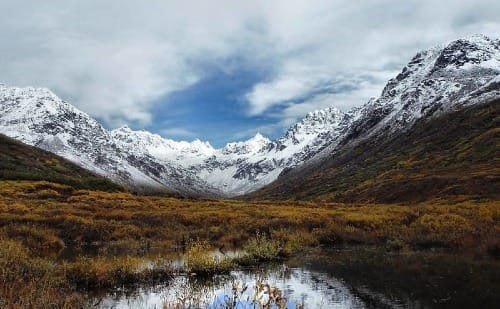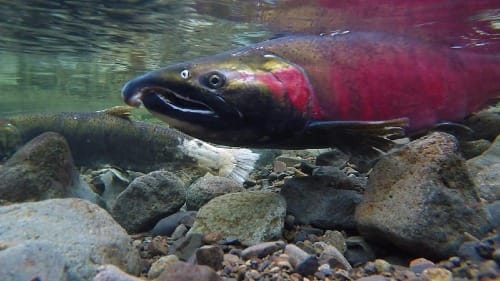Court Considers Whether To Advance Youth Case Challenging Alaska LNG Project

Young Alaskans suing their state government over development of a massive new fossil fuel project were in court this week with their attorneys arguing that their case should proceed to trial.
“These youth come to the court because their health and safety and their access to critical natural resources that they depend on are in extreme danger. They are in a health emergency, and every additional ton of climate pollution brings them further harm,” Andrew Welle, lead counsel for plaintiffs and a senior attorney with Our Children’s Trust, said in his opening remarks before Judge Dani R. Crosby of the Superior Court of Alaska during the October 15 hearing on state defendants’ motion to dismiss the case.
Filed in May this year, the lawsuit Sagoonick v. State of Alaska II challenges a state law mandating construction of the Alaska Liquified Natural Gas project. The Alaska LNG development is projected to result in at least 2.3 billion metric tons of greenhouse gas emissions, which would roughly triple Alaska’s contribution to climate pollution for decades. The eight youth plaintiffs (ages 11 to 22) claim this development breaches their rights – including due process and public trust rights – under Alaska’s constitution, and they seek a court declaration that the law requiring the project be built is unconstitutional. It is the first youth climate lawsuit in the US to challenge a specific fossil fuel project on constitutional grounds.
State defendants include the state of Alaska, the Alaska Gasline Development Corporation – a state-owned entity – and AGDC president Frank Richards. Defendants filed a motion to dismiss the case in July.
The hearing on that motion comes just one week after top climate scientists warned in the 2024 state of the climate report that the world is “on the brink of an irreversible climate disaster” and undoubtedly faces a global emergency. The scientists say that rapidly phasing down fossil fuels should be an urgent and top priority.
Alaska, one of the largest oil and gas producing states in the US, is doing the opposite by continuing to expand and authorize oil and gas extraction.
“Yet with full knowledge of these [climate] dangers, their government has enacted and is actively carrying out a statutory mandate to develop the Alaska LNG project, which in the face of the climate emergency that is harming these plaintiffs, would more than triple Alaska’s greenhouse gas emissions and climate pollution for decades, locking in irreversible and escalating harms to these youth,” Welle told the court.
The state argued that plaintiffs’ constitutional claims are not justiciable because they implicate policy determinations that are not reviewable by courts. “The court doesn’t get to reweigh policy decisions,” Alaska Assistant Attorney General Margaret Paton Walsh contended. She said that assertions about the LNG project’s climate impacts are speculative and amount to mere predictions subject to considerable uncertainties.
Welle pushed back on that argument during the hearing. “Defendants argue there is no way to determine under what circumstances the project might be developed. But it is a matter of fact that there is no feasible way for a project of this size to go forward that would not result in a catastrophic and devastating level of emissions and harm to these plaintiffs,” he said.
The Alaska LNG project is expected to have a capacity to transport up to 3.9 billion cubic feet of fossil gas per day for processing and eventual combustion, with much of it likely to be shipped overseas. The US is the world’s largest exporter of liquified natural gas, which independent scientific analysis suggests is a growing source of climate pollution. A recently published peer reviewed study finds that LNG has a greenhouse gas emissions impact that is worse than coal by up to 33%, considering full life-cycle emissions including from shipping the fuel for export.
By challenging the state law requiring the development of the Alaska LNG project, the youths’ lawsuit aims to stop it from moving forward.

Alaska’s constitution under Article VIII protects citizens’ access to replenishable natural resources such as fish and wildlife, which must be responsibly managed as part of the public trust. But the climate crisis threatens these resources, and unleashing more emissions through fossil fuel mega-projects like Alaska LNG violates youth plaintiffs’ public trust rights under the state constitution, the lawsuit alleges.
“The Alaska LNG project is the single most consequential project the state is pursuing when it comes to the health and safety of these youth and their access to fish and wildlife, which Alaska’s constitution guarantees,” Welle told the court. “The allegations in the complaint tell us that Alaska can have the Alaska LNG project, or it can have salmon and other replenishable resources for youth and future generations, but it cannot have both.”


